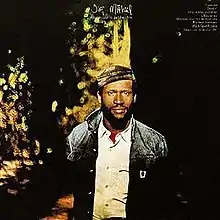| Happy Just to Be Like I Am | ||||
|---|---|---|---|---|
 | ||||
| Studio album by | ||||
| Released | 1971[1] | |||
| Genre | Blues | |||
| Length | 42:36 | |||
| Label | Columbia | |||
| Producer | Taj Mahal, David Rubinson | |||
| Taj Mahal chronology | ||||
| ||||
| Review scores | |
|---|---|
| Source | Rating |
| AllMusic | |
| Christgau's Record Guide | B+[2] |
| The Encyclopedia of Popular Music | |
| Rolling Stone | |
Happy Just to Be Like I Am is the fourth studio album by American blues artist Taj Mahal.[1]
Reception
Christgau's Record Guide said in their review: "this relaxed, witty survey of musical Afro-America is strongest when its compositions verge on interpretations".[2] Disc and Music Echo called it a "fine album, it's funky and it's gutsy, and there's splended brass on it".[5] Rolling Stone Magazine said it is a "loose riotous blues 'n roots album", and that Taj Mahal is "nearly alone carrying the torch of the country music blues for other young black musicians to hear".[5]
Eric Zoeckler wrote in the St. Louis Post-Dispatch that it is the "unconventional mixture of instruments, Taj's six-holed fife, a section of four tubas, gung-ko-gwees, flugelhorns and steel bodied guitars, that makes this recording the delight that it is".[6]
Track listing
All tracks composed by Taj Mahal; except where indicated
- "Happy Just to Be Like I Am" (3:49)
- "Stealin'" (Gus Cannon) (6:58)
- "Oh, Susannah" (Traditional) (5:19)
- "Eighteen Hammers" (5:45)
- "Tomorrow May Not Be Your Day" (4:14)
- "Chevrolet" (Ed Young, Lonnie Young) (2:45)
- "West Indian Revelation (AKA West Indian Reservation)" (6:09)
- "Black Spirit Boogie" (7:10)[1]
Personnel
- Taj Mahal - guitar, steel guitar, mandolin
- Bill Rich - bass
- Howard Johnson - baritone saxophone
- Jesse Ed Davis - guitar on "Oh Susanna" and "Chevrolet"
- Earl McIntyre - trombone
- Andy Narell - steel drums on "West Indian Revelation"
- John Simon - piano
- Hoshal Wright - guitar
- Kwasi "Rocky" Dzidzornu - conga
- Bob Stewart - flugelhorn
- Joseph Daley - tuba
- James Charles Otey, Jr. - drums[7]
- Technical
- Glen Kolotkin - engineer
- John Simon, Taj Mahal - mixing[7]
References
- 1 2 3 4 "Happy Just to Be Like I Am - Taj Mahal | Songs, Reviews, Credits". AllMusic. Retrieved May 24, 2021.
- 1 2 Christgau, Robert (1981). "Consumer Guide '70s: M". Christgau's Record Guide: Rock Albums of the Seventies. Ticknor & Fields. ISBN 089919026X. Retrieved March 2, 2019 – via Robertchristgau.com.
- ↑ Larkin, Colin (2006). The Encyclopedia of Popular Music. Vol. 8. MUZE. p. 26.
- ↑ Marsh, Dave; Swenson, John (1979). The Rolling Stone Record Guide: Reviews and Ratings of Almost 10,000 Currently Available Rock, Pop, Soul, Country, Blues, Jazz, and Gospel Albums (1st ed.). New York: Random House. p. 230. ISBN 978-0-3944109-6-8. LCCN 79004757.
- 1 2 McStravick, Summer; Roos, John (2001). "Taj Mahal". Blues-rock Explosion. Old Goat Publishing. pp. 170–171. ISBN 978-0-9701332-7-4.
- ↑ Zoeckler, Eric L. (February 24, 1972). "Happy Just to Be Like I Am". Record Reviews. St. Louis Post-Dispatch. p. 5D.
- 1 2 "Happy Just to Be Like I Am - Taj Mahal | Credits". AllMusic. Retrieved May 24, 2021.